College of Professional Studies

Industry Spotlight Making a Difference With Nonprofit Careers
Inspired Wanda's Journey to Complete Her Bachelor's Degree
Faculty Profile: Chief David Emanuel Fire Service Administration


Industry Spotlight Making a Difference With Nonprofit Careers
Inspired Wanda's Journey to Complete Her Bachelor's Degree
Faculty Profile: Chief David Emanuel Fire Service Administration

Puerto Rico has over 270 miles of beautiful Caribbean coastline, a tropical climate, and crystal-clear waters; making it a paradise for locals and visitors. Inside its rich cultural heritage – a fusion of Spanish, African, and indigenous Taíno roots – there is a strong sense of family, generosity, and warmth in the community.
Wanda Castillo-Diaz was born 30 minutes from San Juan in Trujillo Alto and her approach to life, likely influenced from her early years in Puerto Rico, has shaped her sense of community.
“Puerto Rico is like a large family where people genuinely care about one another. Being Puerto Rican means that I love deeply, eat yummy food, and am humble.”
The economy of Puerto Rico is mainly driven by manufacturing, the service industry, and tourism and there is stark contrast today between the median household income in Puerto Rico ($21,967), nationally in the U.S. ($69,021), and in New Hampshire ($83,449), Wanda’s home state.
As a young mother, Wanda worked several jobs (as a collections agent, assembler, cleaner) trying to make ends meet. A search for better job prospects caused Wanda and her husband, Irvin, to leave Puerto Rico in hope of improving their family’s prospects.
“We were seeking better job opportunities, better schools, and a family-friendly
place to raise our six children.”
Following a trip to visit with friends in New Hampshire, Wanda’s entire family moved to Manchester, New Hampshire, including her mother, her three siblings and their families, an aunt, and her children and their families.
Once she moved to New Hampshire, she served as a volunteer interpreter, helping family members and friends connect with essential community services. Wanda discovered a passion for helping others navigate complex systems. She treasured helping people feel more comfortable and confident in their new environment.
“I would connect with others because I shared many of their life experiences. I managed to live ‘the American dream’ despite some obstacles, and I am grateful for it. Being one of the fortunate few, I was able to overcome the expectations and statistics because of my mentors and role models.”
While providing interpretation for relatives and friends, she established herself as a leader in the Latino community. She built a strong
foundation of trust as she worked to ensure the health and well-being of her neighbors and community members. Again, she found herself in a variety of jobs that aligned with her passion for health, including working as an EKG technician, lactation counselor, doula, and mental health support worker.
She was soon recognized as an advocate for more inclusive policies and support services which, combined with her direct care experience, led to the opportunity for training to become a community health worker. She worked in an HIV prevention program, as a home visitor for the Maternal Child Health program, and as a peer educator with the Manchester Health Department.
Established in 1839, the City of Manchester Health Department focuses on three critical areas of public health: protection, prevention, and promotion. Wanda has been involved in every aspect of its mission.
Today, Wanda is on the frontlines of public health. She serves as the Community Health Worker Supervisor. She supports staff with case management and advocacy, connection to integrated health care, basic needs problem solving, violence interruption, and community engagement.
From her experience, Wanda sees clearly
the biggest challenges in public health in Manchester. These issues include a lack of accessible support for substance use and substance use disorders and recovery, a lack of safe, affordable housing and family-sustaining jobs and wages to thrive, and racial disparities in health, education, and access to resources and services.
But it is the opportunities for positive change that motivate her.
“I always look forward to getting up in the morning and heading to work. Although typically when I meet someone for the first time, they are going through a crisis, being able to assist people is one of the things I value most in life.”
She sees great opportunity for strong, social service and grassroots nonprofit organizations to lead work which addresses community-based social determinants of health. She imagines greater alignment between efforts to truly leverage the community assets present in the Manchester community, and believes strongly that new and increased investment in Manchester by the federal government may support planning and infrastructure targeted to those most in need.
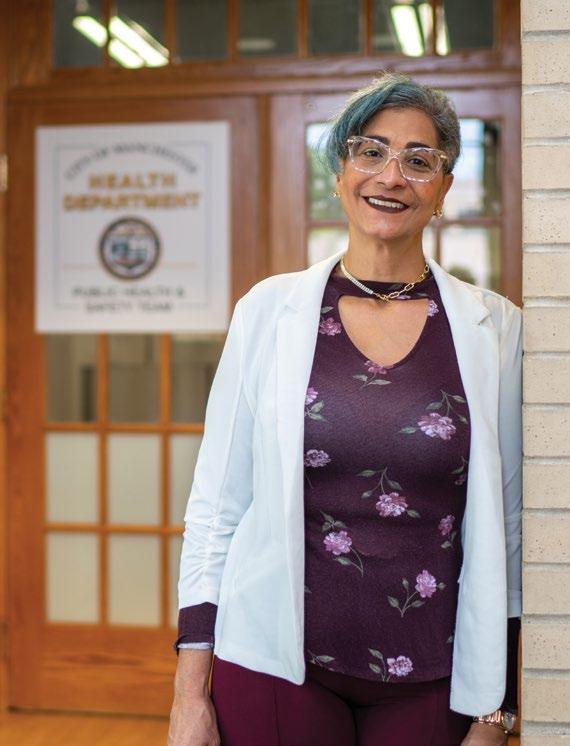
Wanda graduated in June 2023 with her B.S. in Psychology and a minor in Addictions Studies. She participated in a program associated with Network4Health, an organization that provides scholarships aimed at strengthening the workforce within human services and behavioral health.
Like most adult students, Wanda was compelled to return to college to advance her skills and achieve more specialized knowledge. Her motivation was even more complex and highly personal.
She describes that she always wanted to study psychology to learn more about the complicated connections between human behavior and the environment in which we live. She wanted to understand more about how culture affects us, drives us, and how our personalities affect our behavior.
“Psychology allows us to gain a greater understanding of human behavior and mental processes to better comprehend how people think, act, and feel. Studying psychology has helped me to better understand those around me.”
The decision to focus on the Addictions Studies concentration was personal. Her son, José, struggled with substance use disorder, so she sought a complete understanding of the disease to support her son.
“It was important for me to learn about this topic and how addiction works in the brain. This allows me not to become an enabler and helped me to accept that

my son was struggling with addiction. I wanted to understand what he was going through without judgment.”
After being sober for five years, Wanda tragically lost José to an accidental overdose after he relapsed. He was a humble and respectful son and father who was known among friends and family for his generous nature. Like his mom, he was always willing and eager to help others in need.
“Some people still have the idea that drug users should be able to simply stop using drugs if they want to change their behavior. Many of us are unaware of the ways in which drugs alter the brain to encourage compulsive drug use. We erroneously see drug usage and addiction as purely a societal issue. From my college course, Understanding the Disease Model of Addictions, I now fully understand addiction is a chronic brain disorder that alters the way the brain is built and functions.”
In the near term, Wanda plans to earn a master’s degree in public health, spend time with her family, and volunteer with organizations dearest to her, including Centro Latino de NH, Endowment for Health, and the Conservation Law Foundation. Long term, she imagines returning permanently to her beautiful island of Puerto Rico.

Dave Emanuel is the fire chief in Durham, New Hampshire as well as a nationally recognized leadership speaker. He has over 30 years of career and volunteer fire and EMS experience as a firefighter, company officer, chief officer, and instructor for the NH Fire Academy.
He is professionally credentialed as a Chief Fire Officer by the Center for Public Safety Excellence (CPSE), a graduate of the National Fire Academy’s Executive Fire Officer Program, holds a bachelor’s in business administration and civil engineering and a master’s in public administration from University of New Hampshire. He is also a licensed professional engineer.
Dave has contributed to the fire service as a commissioner for the Commission on Professional Credentialling of the CPSE, on the Board of Directors for the International Association of Fire Chiefs Safety, Health, and Survival Section, and on the Executive Boards of the New Hampshire Association of Fire Chiefs and Seacoast Chiefs Fire Officer Mutual Aid District. He has worked with the IAFC Bullying Behavior Prevention Taskforce since 2017, serving as chair since 2019.
Dave lives in Stratham with his wife Maria and three children, Cole, Graham, and Elly, who are active in Scouts BSA, outdoor recreation, and music.
How did your career in fire service begin?
I grew up in Stratham, NH and was involved in the scouting program which was sponsored by the volunteer fire department. I joined the Fire Department Explorer Post the same year as I became an Eagle Scout, in 1986. I joined the Stratham Volunteer Fire Department when I turned 18 and served as a firefighter, lieutenant, and assistant chief, and I have been honored as a lifetime member of the organization.
I was hired by the Durham Fire Department as a call firefighter in the second semester of my freshman year at the University of New Hampshire in 1991, as a career firefighter in 1997, promoted to the rank of captain in 2008, assistant chief in 2015, and fire chief in 2018.
Why should firefighters consider completing their bachelor’s degree?
I completed my undergraduate studies in a traditional environment, with other traditional college students. When I returned to UNH for my graduate studies, I was an adult learner. I appreciate the tenacity adult learners demonstrate as they pursue their degree. I understand the opportunity cost, not only financially, but with family capital, and admire the commitment to achieve excellence. The investment in my education has paid dividends regarding my career advancement, understanding of my field and management, and providing a network required to support my success as a working professional.
I encourage our team at the fire station to continue their professional development and education because our entire organization benefits from their learning and experience by utilizing information and data to make better decisions and to provide services aligned with best management practices in the industry.
When you learned that Granite State College and UNH were becoming UNH College of Professional Studies, what excited you about the new college?
I was excited to hear about the programs coming together because of my long-standing relationship with New Hampshire’s flagship research university. I had outstanding experiences with my undergraduate and graduate coursework and have relied on the foundation of relationships that I built during these studies throughout my career. I am proud to be a UNH graduate. As they say, it's a great day to be a Wildcat!
Combining Granite State College’s online expertise and the resources of UNH can only heighten the overall student experience.
I look forward to working with our future leaders through the fire service management program.
The anticipation of starting or returning to college is exciting! Of course, it also comes with many questions. Whether you seek career guidance, registration support, financial aid, or academic advising, our team will be available by chat, phone, via Zoom, or email.
Chat Live | Submit a Question cps.unh.edu/online
Inquire & Get Connected cps.unh.edu/contact
Our academic calendar contains important dates related to course registration, financial aid, tuition payment, as well as various academic or college-wide deadlines.
• July 11
Registration begins—Register online or by phone
• July 17 Deadline to submit a request for a course not on the schedule
• August 4
Preferred Financial Aid submission date
• August 11
SAP appeal deadline for term reentry (due by Noon ET)
• August 16
Tuition and fees payments due no later than 5:00 p.m. (ET) for all courses beginning the week of August 28, 2023. This includes payment arrangements, such as financial aid. Immediate payment is required in order to register for courses after this deadline.
• August 28 - September 1
First week of Term 1
• September 1
Last day to add Term 1 courses
• September 8
Last day to drop Term 1 courses
• September 28
Last day to withdraw from Term 1 courses
• October 16-20
Last week of Term 1 courses
• October 18
Tuition and fees payments due no later than 5:00 p.m. (ET) for second term, week of October 30, 2023. This includes payment arrangements, such as financial aid. Immediate payment is required in order to register for courses after this deadline.
• October 30 - November 3
First week of Term 2 courses
• November 3
Last day to add Term 2 courses
• November 10
Last day to drop Term 2 courses
• November 30
Last day to withdraw from Term 2 courses
• December 18-22
Last week of Term 2 courses

Focused exclusively on adult students, we have been consistently recognized for our long-term investment in designing and scaling student services, technologies, curricula, and instructor training to support student success. We are top ranked in New Hampshire for "Best Online Bachelor's Programs" and nationally recognized as "Military Friendly®" and among the "Best Online Bachelor's for Veterans" by U.S. News and World Report.
Learn More About All UNH Degree Programs: catalog.unh.edu/programs
• A.S. Behavioral Science (7 Options)
• A.S. Business (10 Options)
• A.S. Communication Sciences and Disorders
• A.A. General Studies
• A.S. Early Childhood Education
Bachelor’s
• B.S. Accounting and Finance
• B.S. Applied Psychology* (9 Options)
• B.S. Business Management (16 Options)
• B.S. Computer Information Technology* (3 Options)
• B.S. Early Childhood Education
• B.S. Criminal Justice
• B.S. Digital Communication Design (2 Options)
• B.S. Health and Wellness
• B.S. Health Care Management
• B.A. Historical Studies*
• B.S. Human Resource Management
• B.S. Human Services (7 Options)
• B.A. Individualized Studies (1 Option)
• B.S. Individualized Studies (6 Options)
• B.S. Marketing
• B.S. Operations, Supply Chain, and Logistics Management
• B.S. Professional Communication (3 Options)
• B.S. Public Administration
• B.S. Technology Management
These options require an earned associate degree in a related field, maximizing your transfer credits toward a bachelor’s degree.
• B.S. Allied Health Leadership
• B.S. Applied Studies Education and Training
• B.S. Applied Studies Management
• B.S. Fire Service Administration
• B.S. Nursing (RN to BSN)
Note: Professional licensure, certification, or training may serve as a foundation to these degrees, upon approval by Academic Affairs.
• Accounting
• Addictions Studies
• Adult Learning and Development
• Applied Psychology*
• Business and Strategic Communication
• Computer Information Technology*
• Counseling Foundations
• Court Advocacy
• Criminal Justice
• Data Analytics
• Digital Marketing*
• Early Childhood Education
• Economic Sciences*
• Education Advocacy
• Emergency Management Strategy and Planning*
• Entrepreneurship and Innovation*
• Family Studies
• Finance
• Global Business
• Graphic Design
• Health Care Management
• Historical Studies*
• Hotel, Restaurant, and Travel
• Human Resource Management
• Human Services
• Interpersonal and Organizational Communication
• Leadership, Change, and Social Responsibility*
• Management
• Nonprofit Management
• Operations, Supply Chain, and Logistics Management
• Organization and Business Administration*
• Organizational Psychology
• Professional Sales
• Public Administration and Policy
• Visual Communication and Social Media
• Wellness and Prevention
• Writing for Visual Media
• M.S. Health Care Management
• NEW! Accelerated M.S. Health Care Management
• M.S. Human Services Administration
• M.S. Instruction and Leadership
(Requires Post-Baccalaureate Teacher Certification with a minimum of 24 earned credits)
• M.S. Leadership
• M.S. Nursing Health Care Leadership
• M.S. Project Management
Nursing Degrees are CCNE Accredited
To read more, visit: chhs.unh.edu/nursing/accreditation
We offer four NH Department of Education-approved bachelor’s degrees with a selection of teacher certification options.
B.S. in English Language Arts* Certification options include:
• Early Childhood Education and Early Childhood Special Education
• Elementary Education and General Special Education
• General Special Education
B.S. in Math Studies* Certification options include:
• Elementary Education and General Special Education
• General Special Education
• Mathematics, Middle Level
• Mathematics, Middle Level and General Special Education
• Mathematics, Upper Level
B.S. in Social Studies* Certification options include:
• Elementary Education and General Special Education
• General Special Education
B.S. in Early Childhood Education Certification options include:
• Early Childhood Education and Early Childhood Special Education
*New program name for Fall Term
These programs allow you to specialize your knowledge through a shorter, focused sequence of courses. The credits earned in our certificate programs can also be applied toward its corresponding master’s programs, allowing you to earn a certificate on the way to a degree.
• Health Care Management
• Human Services Administration
• Nonprofit Leadership
• Operations Management
• Project Management
*For a complete listing of all UNH online graduate programs, including M.S. Cybersecurity Policy and Risk Management, M.S. National Security Intelligence Analysis, and Data Science Certificate, visit online.unh.edu/academics
For those with a bachelor’s degree seeking initial or an additional certification.
• General Special Education
• General Special Education and Elementary Education
• Early Childhood Special Education and Early Childhood Education
• Life Sciences, Upper Level
• Mathematics, Middle Level
• Mathematics, Upper Level
• Elementary Education
• General Special Education
• Early Childhood Special Education and Early Childhood Education
• Life Sciences, Upper Level
• Mathematics, Middle Level
• Mathematics, Upper Level
• Reading and Writing Teacher**
• Reading and Writing Specialist**
• Digital Learning Specialist
For certified special education teachers.
• Specific Learning Disabilities (SLD)
• Intellectual and Developmental Disabilities (IDD)
• Emotional and Behavioral Disabilities (EBD)
**Two years of classroom teaching experience required. Reading and Writing Specialist also requires a master’s degree in literacy or related field for certification.
3 1-855-472-4255 | cps.unh.edu/online

With the merger between Granite State College and UNH, there are many exciting Fall Semester updates associated with the newly formed UNH College of Professional Studies! Visit Our New Website at: cps.unh.edu/online
In addition to adjustments to our program names, several course titles have also been adjusted, and course numbers changed. For a complete walkthrough of the course title and number changes, view the 2023-2024 Schedule and Planning Tools. Visit: cps.unh.edu/degree-planning-tools
We’re excited to utilize the abundance of resources provided by the UNH Manchester Library and UNH Bookstore.
For purchasing Fall Term course materials, visit the UNH Bookstore at: unh.bncollege.com For accessing UNH Manchester Library resources and support, visit: cps.unh.edu/library
| cps.unh.edu/online
To help you navigate transitioning systems, we’ve built a page on our new website with quick links to access your student accounts. For Easy Access, Visit: cps.unh.edu/online/resources/access-my-accounts
WebCat:
In place of WebRock, students will now use WebCat to register for classes, access their grades, and pay tuition and fees.
Access WebCat: webcat.unh.edu
To seamlessly integrate with the UNH academic programs, a few of our degrees and options are receiving name changes.
• B.S. Information Technology B.S. Computer Information Technology
• B.S. Psychology B.S. Applied Psychology
• B.A. History B.A. Historical Studies
• MSN Health Care Leadership M.S. Nursing Health Care Leadership
• Business Administration Organization and Business Administration
• Information Technology Computer Information Technology
• Economics Economic Sciences
• Emergency Management Emergency Management Strategy and Planning
• Entrepreneurship Entrepreneurship and Innovation
• Leadership Leadership, Change, and Social Responsibility
• Marketing Digital Marketing
Undergraduate Teacher Certifications Degree Type Changes:
• B.A. B.S. English Language Arts / General Special Education
• B.A. B.S. English Language Arts / ECE and EC Special Education
• B.A. B.S. English Language Arts / Elementary Ed / General Special Education
• B.A. B.S. Math Studies / General Special Education
• B.A. B.S. Math Studies / Elementary Education / General Special Education
• B.A. B.S. Math Studies, Middle Level/General Special Education
• B.A. B.S. Math Studies, Middle Level
• B.A. B.S. Math Studies, Upper Level
• B.A. B.S. Social Studies / General Special Education
• B.A. B.S. Social Studies / Elementary Education / General Special Education

We are dedicated to supporting you as you complete your program. Our knowledgeable and caring advisors assist students as they transition to our learning environment. They also help students identify goals and develop strategies to achieve them.
Schedule an Advising Appointment:
Call: 1-855-472-4255 or Chat Live at: cps.unh.edu/online
The details included in the printed and digital version of this course schedule are helpful for planning and accurate as of the date of publishing. For the most up-to-date course information, visit our Course Search Database. Search for a UNH CPS course by selecting the CPS Online "campus" and entering Course Subject & Number (Ex: MGMT 611) or Title (Ex: Money and Banking).
Visit: courses.unh.edu
College Catalog
The College Catalog contains helpful information such as course descriptions, prerequisites, restrictions, and policy information.
Visit: catalog.unh.edu
Along with the fresh design of our brand to align with University of New Hampshire, soon we'll transition to new social channels! For now, stay connected with our online student community through our current social media channels and blog.
Social Media
Facebook: @granitestatecollege Instagram: @unhonline
On the Web
Visit: cps.unh.edu/online
Current Student Resources: cps.unh.edu/current-students
Student Success Blog
Visit: cps.unh.edu/blog
1-855-472-4255 | cps.unh.edu/online
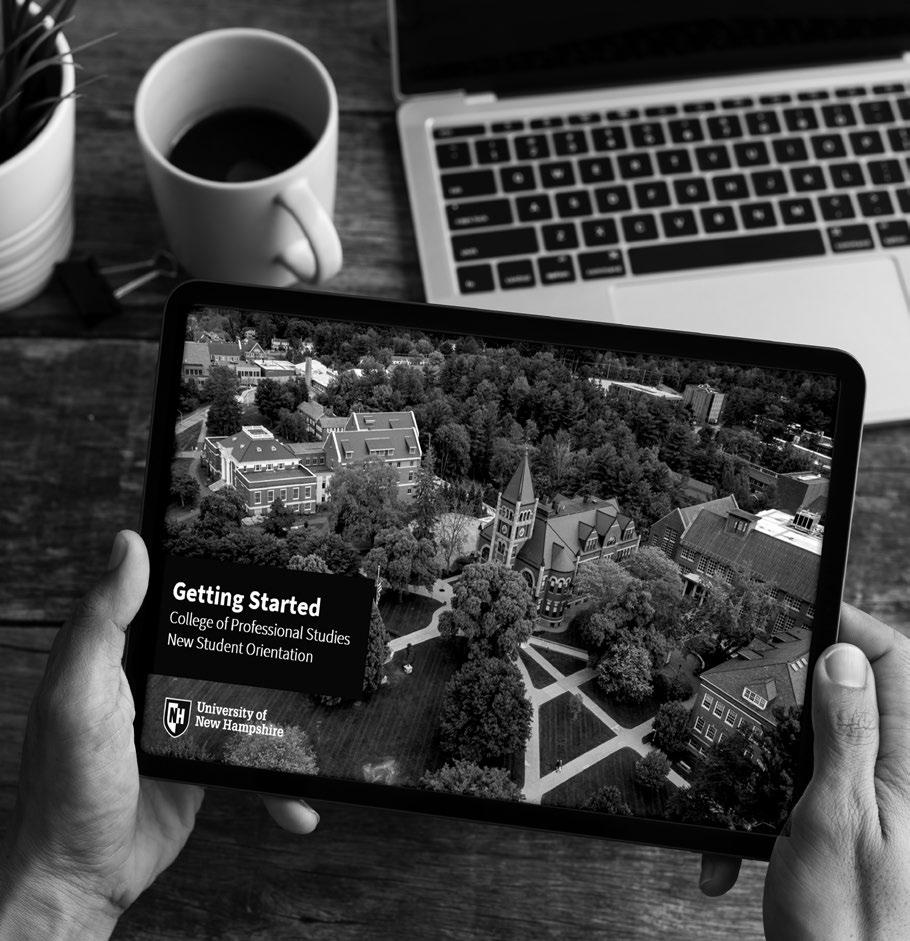
Whether you’re starting college for the first time or returning to finish your degree, attending an orientation gives you a valuable introduction to the College that will help you feel prepared as a student.
There are two types of essential orientations:
• New Student Orientation
Overview of the resources and support available to you as a student, plus success tips for your first term.
• Canvas Orientation
Learn how to navigate and participate in your online courses in Canvas, the College’s learning management system.
Orientations are available on-demand and via live webinars.
View Details & Dates: cps.unh.edu/orientation
The course and all direct instruction is 100% online. These courses include no requirements for face-to-face contact, on-site instruction, or for the student to be online at specified times (except proctored exams when applicable).
The course is online. There is no requirement for face-to-face contact, or on-site instruction. All class activity is completed online and organized around scheduled class meeting days/ times.
Note:
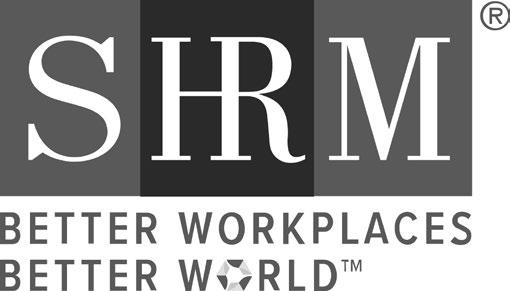

The following listing displays in-state tuition cost. A full breakdown of tuition and fees is available on page 22. Courses each term are subject to change from the time of printed publication. For the most up-to-date course information, visit: courses.unh.edu
Note: Registration hold - advisor approval required | Online Synchronous: Virtual meetings on 8/29, 9/12, 9/26, 10/10, 10/24, 11/7, 11/21 from 6:00 PM to 7:30 PM | Capstone Virtual Event Days: 12/6/23, 6:00-8:00 PM, 12/7/23, 6:00-8:00 PM
Note: Registration hold - advisor approval required | Online Synchronous: Virtual meetings on 8/30, 9/13, 9/27, 10/11, 10/25, 11/8, 11/22 from 6:00 PM to 7:30 PM | Capstone Virtual Event Days: 12/6/23, 6:00-8:00 PM, 12/7/23, 6:00-8:00 PM
Note: Online Synchronous: Virtual meetings on 8/29, 9/5, 9/12, 9/26, 10/3, 10/10, 10/17 from 6:40 PM to 9:00 PM
Note: Online Synchronous: Virtual meetings on 10/31, 11/7, 11/14, 11/21, 11/28, 12/4, 12/12, 12/19 11/21 from 6:40 PM to 9:00
Note: Online Synchronous: Virtual meetings on 8/29, 9/5, 9/12, 9/19, 9/26, 10/3, 10/10, 10/17 from 6:10 PM to 8:00
6:30




The following listing displays in-state tuition cost. A full breakdown of tuition and fees is available on page 22. Courses each term are subject to change from the time of printed publication. For the most up-to-date course information, visit: courses.unh.edu
The following courses are open to students admitted to the Post-Baccalaureate Teacher Certification Program or by permission of the School of Education. Additionally, these courses are open to other qualified individuals who wish to take one or more courses on a continuing professional development basis. For more information, contact the School of Education at 603-822-5431.

1. Review your degree planning tools through DegreeWorks to determine unmet requirements. Access your degree audit through WebCat.
2. For each course you wish to take, check prerequisites to ensure you have completed all of them. Please note that some undergraduate courses require a pre-registration skills assessment.
3. Contact your academic advisor with any questions.
To Register for Courses, Visit Us Online or Call: cps.unh.edu/register | 1-855-472-4255
UNH reserves the right to cancel, postpone, or combine class sections, limit registrations, or change instructors. We regret any errors in printing, but we accept no liability for them. Please refer to WebCat for the most updated course schedule.
Students may register for 8-week courses during the official Add Period, which is one week after the course start date.
Students may drop courses during the official Drop Period, which is two weeks after the course start date.
Contact your advisor or the Registrar’s Office for assistance. For courses that do not follow the 8-week schedule, Add Period and Drop Period dates are posted on cps.unh.edu/add-drop.
by August 16, 2023 (5 p.m. ET)
If a third party (such as an employer or outside agency) has agreed to pay all or part of your course charges, you must provide a written billing authorization to the Student Accounts Office. The billing authorization must be on official letterhead and include the billable amount. No extensions or deferments will be granted if you will be reimbursed for courses after the completion of a term. Payment must be made directly to UNH upon receipt of an invoice. Payment not contingent upon grade. Cash will not be accepted.
Contact the Student Accounts: 603-513-1330 | 855-472-4255 option #4 studentaccounts.cps@unh.edu
When enrollment is available, Payment Plan links will appear on the Account View page in Webcat. The payment plan carries an enrollment fee of $60 for each semester you enroll in the plan.
22 1-855-472-4255 | cps.unh.edu/online
Tuition and Fees (Updated 3/7/23)
Course charges, fees, and regulations are subject to approval by the University System Board of Trustees and can change without prior notice.
For Tuition Updates, Check: cps.unh.edu/tuition
Undergraduate and Post-Baccalaureate Costs:
• $314 per credit hour in-state ($379 out-of-state)
• $314 per credit hour for learning agreements
Graduate Costs:
• $558 per credit hour in-state ($609 out-of-state)
• Registration Fee: $46
• Academic Services Fee: $46
• Field-Based Mentoring Fee: $275 *
• Prior Learning Assessment Fee: $350
Some courses have materials or other fees (see individual course listings).
*Field-based courses that require the oversight of a Field-Based Mentor will have an additional fee assessed.
Students are responsible for purchasing textbooks and materials. Textbooks are an additional expense. Find detailed information about required books, including ISBN, online.
Visit: unh.bncollege.com
Federal, State, and/or Institutional Financial Aid is available to all qualifying degree seeking students, as well as eligible postbaccalaureate and graduate students, to assist with the cost of their education. Students must complete the Free Application for Federal Student Aid (FAFSA), be admitted to an eligible program, and be attending at least half-time (undergraduate and post-baccalaureate students: 6 credits/semester; graduate students: 5 credits/semester) in order to receive aid.
Contact the Office of Financial Aid at: 603-513-1392 | 855-472-4255 option #3 financialaid.cps@unh.edu
Learn More, Visit: cps.unh.edu/tuition-aid

As part of the University System of New Hampshire, we take the mission of expanding access to public higher education for adults to heart.
Our Undergraduate and Graduate Tuition Rates are Among the Lowest in New England for Residents and Non-residents.
Still, we recognize that affordability is about more than low tuition price, which is why every department contributes to affordability on behalf of our students.

It begins with a free, open application and streamlined admission process that respects and values your time.
We are experts at helping students maximize academic credit through prior learning. By demonstrating collegelevel competencies, 89% of our undergraduates earn credit before they have taken their first course!
Our expert faculty continuously seek ways to make low or no-cost resources available to you. It is another way that we reflect our priority for affordability and personalized learning, as opposed to “one-size-fits-all” approaches.
Our programs are designed to meet the demands of working adults. We offer students online, hybrid, and field-based coursework, providing you with the flexibility to work full time while completing a degree.
Students in need of assistance with tuition and other costs related to their education may find help through one of several financial aid programs at UNH.
Borrowing responsibly is critical. We provide financial aid counseling to help students be good consumers, seeking options with protections like income-based repayment plans.
Veteran and military-affiliated students and spouses may be eligible for benefits, tuition waivers, or discount programs. All our degree programs are approved for Veteran and Military education benefit programs.
Tuition discount programs offered through our employer partners can help defray the cost of tuition for employees and their families. Visit: cps.unh.edu/employer-partnerships
Finance Your Education in 5 Steps cps.unh.edu/tuition-aid

• Change Management
Business careers have mass appeal for obvious reasons: steady job growth, competitive salaries, and a range of exciting and innovative work. A passion for the business sector is important, but a plan is what will help you achieve your career goals.
In this guide, we focus on how you can develop your own, personalized business career plan and breaks down the process into manageable steps that can help prepare you for your ideal job. UNH College of Professional Studies offers a range of career-focused business degrees and programs. When you download our Business Career Guide, an advisor will follow-up with information about these options!

UNH College of Professional Studies online master's degree programs are led by well-respected faculty members who are active in their discipline and maximize the connection between the course material and solutions for addressing complex community and workplace challenges.

M.S. Cybersecurity Policy and Risk Management (30 credits)
Designed for working professionals from a variety of backgrounds, this program fosters the strategic thinking, policy development, and risk management skills that will set you apart in the high-demand cybersecurity field.
M.S. Health Care Management (30 credits)
Deepen your knowledge of the dynamic field of health care and gain specialized skills to help grow your career.
Ask about our Accelerated Master's Option for Undergraduate Students
M.S. Human Services Administration (30 credits)
Gain the skills, knowledge, and values necessary to lead human services agencies and organizations.
M.S. Instruction & Leadership (36 credits)
Designed as a master's capping program for alumni with our Post-Baccalaureate Teacher Certification.
M.S. Leadership (30 credits)
Built for current or emerging leaders in any field. Learn to lead teams, cultivate a strategic vision, and communicate effectively to maximize your organization's potential.
M.S. National Security Intelligence Analysis (30 credits)
Develop a deep understanding of the United States and foreign countries’ national security issues, strategies, and policies. This program prepares you to be a leader in security intelligence.
M.S. Nursing Health Care Leadership (30 credits)
Become a versatile nursing leader who can lead change, promote health, and improve care for multiple populations.
M.S. Project Management (30 credits)
A practice-oriented program ideal for managers to enhance their ability to integrate complex projects, motivate people, and achieve cost-effective results.

The nonprofit sector represents the third largest workforce in the U.S. and constitutes the third largest payroll of any industry in the nation.
This makes nonprofit organizations an essential pillar in our nation’s economy. But in addition to the economic value that nonprofits provide, they also contribute to the wellbeing of our nation as a whole.

Nonprofit organizations compose an essential sector of infrastructure dedicated to social causes that promote the betterment of society.
Professionals in the field are engaged in a broad spectrum of mission-driven work which spans education, social services, arts and culture, environmental protection, healthcare, and more. Nonprofit organizations are trailblazers of progress throughout the nation, including in the areas of medical research advancement, educational development, environmental safeguarding, diversity, equity and inclusion, and cultural elevation.
The demand for nonprofit workers is constantly growing. Between 2007 and 2017, job openings in the nonprofit sector grew by more than eighteen percent – three times faster than the national average for any other industry. And while skepticism over nonprofit salary rates is common, reports show that weekly wages for nonprofit employees are almost equal to and sometimes even greater than those of their for-profit counterparts.
SOURCES:
John Hopkins University Center for Civil Society Studies. 2020 Nonprofit Employment Report. (Visited April 2023).
Nonprofit Program Development
Design and develop initiatives, resources, and interventions that serve the needs of a nonprofit’s clients or community. Program development and execution is where the organization’s mission comes to life.
Nonprofit Management and Governance
Address the operational needs of the organization including staffing, volunteer management, funding, asset management, program evaluation, strategic planning, and stakeholder communications.
Financial Planning and Management
Prepare and examine financial records and advise leadership on strategic decisions using a financial viewpoint. Ensure the organization consistently follows all guidelines for nonprofit tax status.
Marketing for Nonprofits
Develop and communicate the organization’s value proposition to current and potential benefactors, the general public, and mass media using a range of marketing channels and techniques.
Fundraising and Resource Development
Research and assess the most appropriate funding sources for the organization, including but not limited to: contributions from individuals, foundations, corporations, and even government entities. Nurture relationships with stakeholders and execute fundraising activities and programs that will enable fulfillment of the organization’s mission and strategic goals.
Program Evaluation
Coordinate with program developers to define the success metrics of a nonprofit’s programs and assess the effectiveness of programs using data and evidence. Use evaluation results to drive continuous improvement to program design. Prepare data for organization reports to be shared with stakeholders to demonstrate the organization’s value proposition and provide “ROI” to financial supporters.

What fundamental qualities make an effective nonprofit?
“There must be a mission that is clear and engaging. It must have unambiguous goals that benefit a segment of society. To be effective, nonprofits need active members and partners willing to give time, expertise, and financial or in-kind resources. Without clear and engaging goals as articulated in a mission statement, a nonprofit will not approach true effectiveness because it will not gain support from benefactors. Related, nonprofits must be mindful of the laws that articulate the requirement of responsible and ethical governance and use of funds.”
- Dennis Martino
Senior Faculty, Business and Technology Programs

How is UNH CPS preparing students to positively impact nonprofits?
“Students learn fundamental leadership skills and ethics. Each student is required to take a nonprofit introduction course where they discover different aspects of nonprofits and learn to write a program review. Additionally, there are unique requirements and needs of nonprofits. For instance, grant writing, fundraising, and volunteer management are rare in the profit world and the Nonprofit Graduate Certificate Program offers these specialized courses. This gives students a unique learning experience with others who work in the nonprofit arena.
Additionally, the faculty are employed in nonprofits and have firsthand knowledge of the different needs of the nonprofit versus the profit sector. Students may use their Nonprofit Graduate Certificate as a pathway to an MS in Leadership.”
- Kathy DesRoches
Director, MS Leadership and Nonprofit Graduate Certificate Program
• A.S. Business (Leadership Option)
• B.S. Accounting and Finance (Nonprofit Management Minor)
• B.S. Business Management (Nonprofit Management Option)
• B.S. Professional Communication (Nonprofit Management Minor)
• B.S. Human Services
• M.S. Human Services Administration
• M.S. Leadership
• Graduate Certificate, Human Services Administration
• Graduate Certificate, Nonprofit Leadership



















































Some aspects of the career hunt haven’t changed much with modern technology. Networking and developing your skills are still integral to finding the right position. However, new technology has afforded you infinitely more possibilities for optimizing your networking, career preparation, and career search to find the right fit.
During our webinar, Career Director Maggie Wells and Academic Advisor and Career Specialist Jennie VanderHooven will help you to learn more about the host of career technologies available to you as a UNH learner. Together, we’ll explore resources such as AI-informed resume review software with VMock and career assessments with Awato.
We’ll also provide an overview of the many other free resources available to you through the UNH Career and Professional Success (CaPS) team.
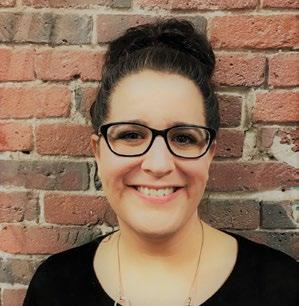
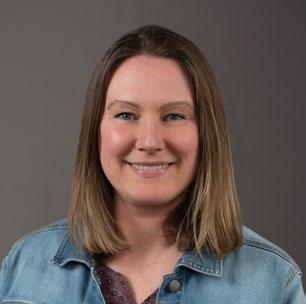
Career
Choose a Session September 12 from 6:00 P.M.- 6:45 P.M. October 23 from 12:00 P.M. - 12:45 P.M.
& Register cps.unh.edu/calendar (Registration is required to join)